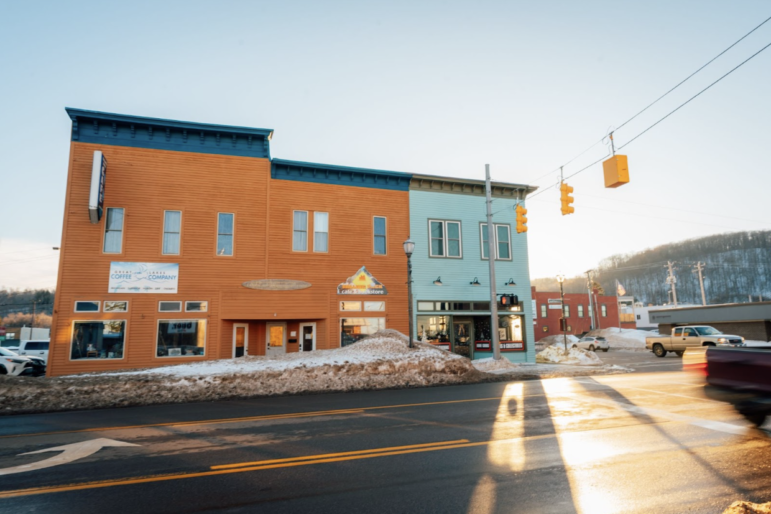
Pure Michigan
Downwind Sports in Munising offers outdoor gear and equipment.By JACK TIMOTHY HARRISON
Capital News Service
LANSING – As businesses increasingly support environmental improvements, the Michigan Department of Natural Resources is offering them a way to expand such efforts.
They include M36 Coffee Roasters, a Whitmore Lake company, in the “These Goods are Good for Michigan” program, where a percentage of the purchase supports the environment.
Another example is Simple Adventures, a statewide kayak rental company based in Macomb County, under the concessionaire program, where businesses can bid to sell their products at parks.
“The goal here is definitely to help in a foundational way to promote tourism and a natural resource-based economy,” said Jon Spieles, acting marketing and outreach division chief for the DNR.
The state’s natural resources provide opportunities for some businesses to grow and flourish, Spieles said.
There is recent increased interest from businesses in the opportunities of the decade-old program that provides the department some revenue, Spieles said. Other opportunities include sponsoring habitat projects and off-road electric chairs to improve accessibility.
Michigan’s outdoor recreation economy is a $10 billion industry and the 13th highest in the country, said Brad Garmon, senior strategic adviser and executive director for the Michigan Outdoor Recreation Industry Office.
And it is growing.
“We’re expanding our outdoor recreation to include the wide range of opportunities to grow and support that whole economy in Michigan to add jobs,” Garmon said.
Garmon works under the Michigan Economic Development Corporation, which has a Pure Michigan Business Connect program.
The program locates people who make things in Michigan and connects them with market opportunities, Garmon said.
A cohort was also established for small businesses to measure social impacts and find investments they could make, Garmon said.
Larger companies such as Carhartt are investing in a program called the Detroit Outdoors Collaborative to help people learn about opportunities to engage in the outdoors and parks, he said.
Garmon said it is important for companies because the outcome of their work makes resources more sustainable for the long-term and ensures they keep customers.
The Michigan Environmental Council supports businesses doing environmental projects, said Conan Smith, the group’s president and chief executive officer.
“Because the values (of the Great Lakes) are so deeply embedded in our culture here, I do think that informs business development, and it drives business attraction,” Smith said. “Michigan is a special place when it comes to the integration of environment conservation with the business community.”
There is enormous growth in boating, skiing, snowmobiling, hiking and biking, Smith said. It’s a very valuable sector.
Companies that have physical ties to communities are likely interested in environmental protection, Smith said. And sustainability is good for businesses economically.
In March 2022, Gov. Gretchen Whitmer allocated $250 million to repair and upgrade state parks and build one in Flint.
Smith applauds the DNR for its creativity and outreach to business but notes a long disinvestment of public dollars in the agency. It should not have to use sponsorships for revenue, he said.
The legislature has failed to keep pace with the needs of the state’s recreation system, Smith said.
“We should not let them off the hook by any means,” he said.
Creating a business network that pushes for a good economy and environment is still a work in progress, said Bob Sutherland, co-chair for the Great Lakes Business Network, a group that helps businesses protect the environment.
“Visiting each other’s businesses to learn from each other, we are also learning how to raise funds for this work through our businesses,” Sutherland said.
Sutherland, founder and president of Glen Arbor’s Cherry Republic, a cherry food company,
wants to get involved with the DNR’s sponsorship initiative. He said customers’ expectations have changed, and they want more green initiatives and renewable energy.
Communities with natural resources and parks such as Silver Lake State Park in Mears and the Porcupine Mountains Wilderness State Park in Ontonagon are important for tourism, said Ron Olson, the DNR’s chief of parks and recreation division. The state generated $2.3 billion in tourism in 2020.
“There’s places like that where the parks become a real big asset to those communities and part of their economic development,” Olson said.
The Vasa Pathway mountain bike trail in Traverse City generates around $4.5 million a year to the local economy, he said. The riverfront in Detroit brings $42 million annually to the Detroit economy, Olson said.
The DNR has partnered with the private sector to upgrade lodging and offered geodesic domes and safari tents at several state parks, Olson said.
Through lodging rental fees, the DNR receives a percentage of the cost, with camping fees being a huge source of funding.
“So this reimagining offering alternative lodging is something we’re really heavily embarking upon,” he said.
It’s important for people to understand and appreciate parks and recreation opportunities, and to also make a personal connection to the community, Spieles said.